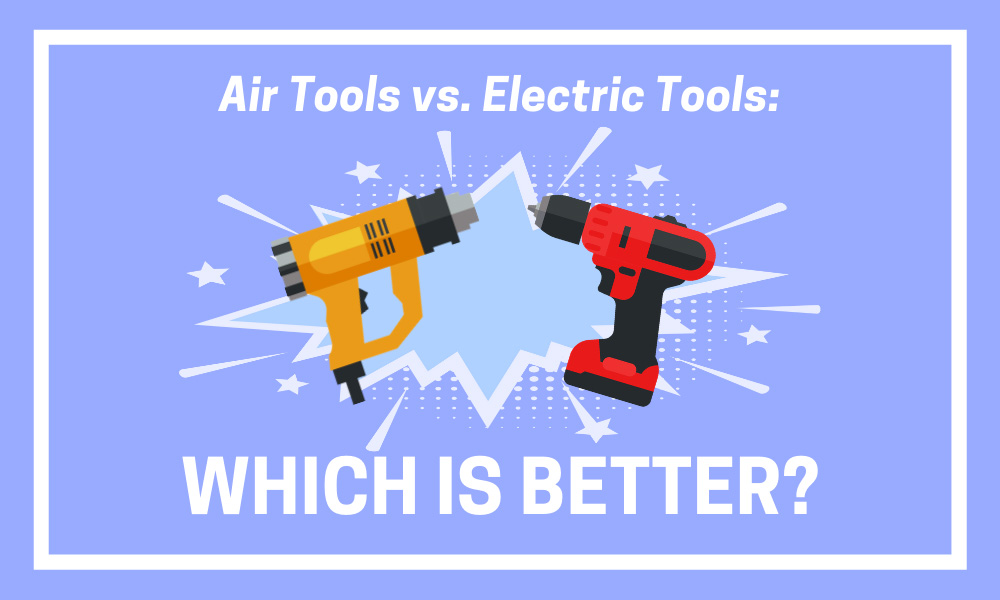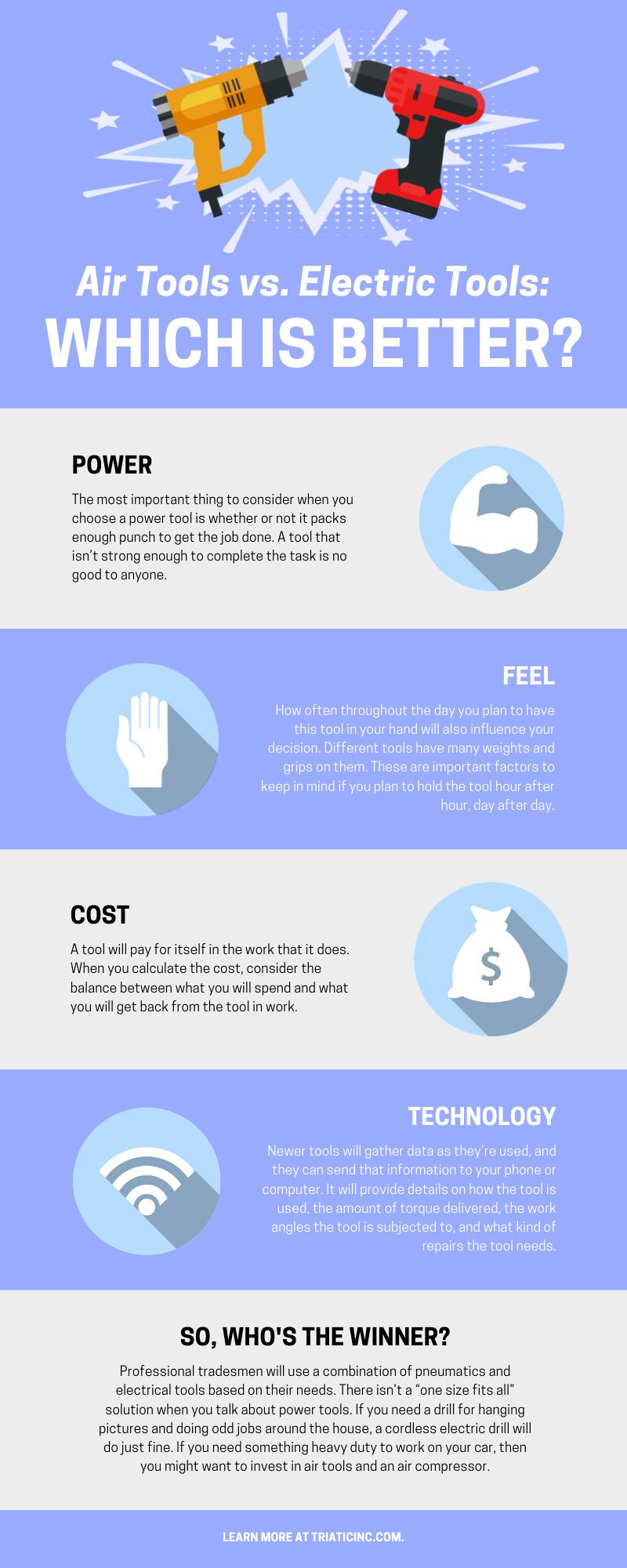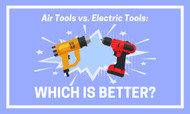Air Tools vs. Electric Tools: Which is Better?
24th Oct 2023

When Henry Ford pioneered the assembly line in 1908, he helped solve efficiency problems in manufacturing. He knew his cars could get built faster if the assembly line moved and each man on the line only had one job to do. With the tools available at the time, Ford’s assembly line relied on compressed air (pneumatics), chains, cables, and pullies to move. Line workers also used pneumatic tools; they were faster and stronger than manual tools and lessened worker fatigue. Pneumatic tools had been around since the 1870s, and the first electric tool was invented in 1895 in the form of a drill. It weighed 16 lbs. and required the operator to use their chest to press the drill onto the work surface. That first electric drill wasn’t very powerful, and wildly cumbersome and inefficient, but it would be 20 years before anyone invented something better. Two men named Black & Decker would revolutionize the electric power tool industry with their hand-held drill.
There are advantages and disadvantages to every power tool. The most common power tools are pneumatic, which are powered by compressed air, and electric, which are powered by a rechargeable battery or a cord. Both kinds have been around for well over 100 years and have seen many advances in design. No matter how they’re powered, though, these tools will inevitably start to wear down and break. Tools are so cheap nowadays that it’s usually better to just buy a new one than to pay to get it repaired. When you’re faced with buying new tools, think about the job you need the tool for, and research which is better for your needs. The argument used to be simple; air tools were light and stronger and electric tools were more versatile. With each advancement in design, weight, and capability of both tools, though, the debate has changed. Let’s go over the pros and cons of air tools vs. electric tools.
Power
The most important thing to consider when you choose a power tool is whether or not it packs enough punch to get the job done. A tool that isn’t strong enough to complete the task is no good to anyone. If you need to cut through granite with a diamond hole saw, you want to know that tool can do the job right. If you need to machine tighten a bolt, you will need a certain amount of torque, so it’s vital the tool you choose can do it. Picking a tool for its cost, or convenience, won’t do you any good if it’s weak. Air tools are famously strong. You can adjust how much power they provide by changing the amount of air the compressor delivers. Incredible power is why pneumatics are popular in machine shops and auto shops. Electric tools are catching up in this category, though. In years past, there was no doubt air tools had superior power, and when compared to cordless tools, it wasn’t even close. Changes in battery technology and tool design are slowly closing the gap between the two tool types. Pneumatics are still more powerful, but they don’t just blowout the competition anymore.
Feel
How often throughout the day you plan to have this tool in your hand will also influence your decision. Different tools have many weights and grips on them. These are important factors to keep in mind if you plan to hold the tool hour after hour, day after day. Air tools are lighter than electric ones, and they will probably stay that way, so grab a few different sizes to find what feels good in your hand. How you will move around the job site changes which tool to use, as well. Pneumatic tools are light weight, but they’re limited in mobility. There is no cordless option with air tools, a hose will always be attached, so keep that in mind. Cordless electric tools allow for better mobility. You aren’t tethered to a power cord or air hose and can move freely without getting tangled up. Electric tools have always been heavier, but that will continue to change as designs improve.
Cost
Spending too much money on anything is never a good idea. Spending too little might mean you get an inferior tool and have to replace it sooner. If you buy cheap, you buy twice. A tool will pay for itself in the work that it does. When you calculate the cost, consider the balance between what you will spend and what you will get back from the tool in work. Air tools have large costs up front. The tools themselves are cheaper to buy than electric, they also last longer, but pneumatics require an air compressor to work, and those can be very expensive. The air compressor is an upfront cost you can’t avoid when you buy pneumatics. Electric tools don’t have that problem, as their power supply is either with them in a battery or waiting in an electrical outlet. Electric tools are always a little more expensive to purchase, but their power supply is already paid for.
Technology
Cell phones and tablets haven’t cornered the market on smart technology. Power tools are getting an extra shot of tech now. Newer tools will gather data as they’re used, and they can send that information to your phone or computer. It will provide details on how the tool is used, the amount of torque delivered, the work angles the tool is subjected to, and what kind of repairs the tool needs. Smart batteries are also getting put into electric power tools that can tell the user when the batteries are overheating and need a break. They can transmit the location of the tool, too. In the event of theft, the tool’s owner can cut the power if the tool leaves a certain area or is used outside a designated time frame.
So, who’s the winner?
Professional tradesmen will use a combination of pneumatics and electrical tools based on their needs. There isn’t a “one size fits all” solution when you talk about power tools. If you need a drill for hanging pictures and doing odd jobs around the house, a cordless electric drill will do just fine. If you need something heavy duty to work on your car, then you might want to invest in air tools and an air compressor. As technology continues to improve, electric tools may surpass the air tools in every category, but we aren’t there yet. Figure out what your needs are, and go with your gut.


